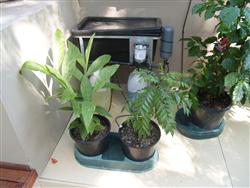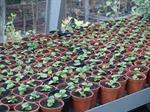
Working as a Horticultural Research Scientist
Where They Work
Research scientists are employed by government and private research facilities including commercial allied trade companies (fertiliser companies, pesticide manufacturers etc.) and universities.
- Commercial companies employ research scientists to develop and test new products.
- Potting media companies often use a soil scientist to develop new and better potting media.
What They Do
They conduct scientific tests on their new products, and extract research data that can be used for both customer services and marketing. The scientist may need to write technical data sheets and promotional material, and give lectures or presentations to colleagues and clients from time to time. Similarly a fertiliser business, pesticide business, or other allied trader may also employ and use scientists in this way.
Scientists who work for public funded research stations have in the past been able to be less 'commercially compromised' in their work, however in today’s world even governments and universities need to be pragmatic about the research which they do and do not fund.
What is Needed
For long term career security as a horticultural research scientist, you need to have a high level of expertise in what you are researching - but also the capacity to move to research in very different areas of horticulture if the f

unding dries up in your specialist area. Broad based research skills and scientific knowledge are important, as is broad plant knowledge (the ability to identify over 1000 different plants for example). Research scientists who have the best careers are well networked and prepared to move to whatever project is offered, wherever it might be in the world. If you want to live in the same suburb and study the same specialisation all of your life - you may not have a future as a researcher.
Some start with a mainstream degree at university, or a diploma, while others begin their career with lower level studies combined with work experience. Either route can eventually lead to the same level of success.
Opportunities
In the long term, qualifications alone will not make you into a successful horticultural scientist. A good scientist needs to have a 'real world' appreciation of industry, and in some respects; the person who works at a lower level in the industry, at the start of their career may always have a different perspective upon the 'reality' of horticultural work.
Any sort of experience will always be valuable, so even if you are studying a diploma or degree - try to get work on weekends or during vacations, in nurseries, orchards, market gardens or with any other horticultural enterprise. If you cannot get paid work, look for voluntary work. Any experience will pay off in the long term, enhancing your skills, insights and career opportunities.
More from ACS
Ebook - Advice from professional horticulturists with decades in the industry.
View eBook
Ebook - Whether you work for yourself or someone else, you need to be able
to present what you have to offer in a way which attracts employers.
As a consultant, you need to stand out from others in your field.
View eBook
Ebook - Improve your capacity to manage any type of project in any type of industry.
View eBook
Become a Professional horticulturist studying 2 years full time; 4 years p/t
View Course
Ebook - easy to read: home systems, commercial systems, media, fish species, fish care.
Planting guide and care; trouble shooting - fish and plants.
View eBook